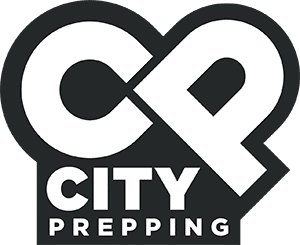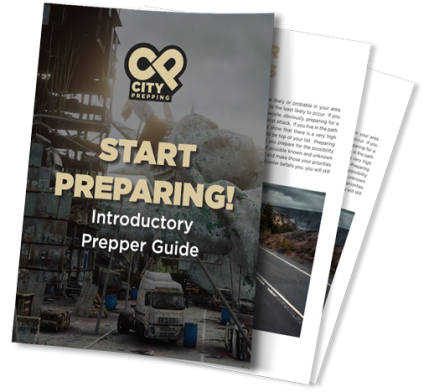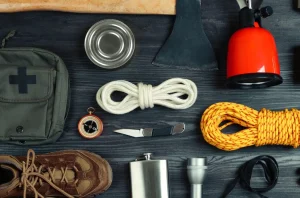Is the term “Urban Survival” an oxymoron? Can preppers really survive long-term in an urban or suburban environment after a catastrophe? In this article, we’ll discuss what you need to know in order to survive.
The #1 comment I hear constantly in the comment section of my youtube channel is to get out of the city and move to the country as soon as possible. So is it even possible to survive long-term if in the grid were down in this type of environment? The answer short answer is, “well, it depends”. The Urban / Suburban environment presents quite a few challenges for long-term survival. But in every situation as a prepper, you should be looking for ways to survive despite the obstacles you face and we’ll discuss different things to consider in this article.

Before we jump into this discussion, it’s worth noting that I’ll be using the term urban and city interchangeably. We need to define “urban” and “city” in the context of this conversation. When we use this term in the article, we will be using it to describe these 3 high-population environments. The Urban environment is something like NY or Los Angeles. A Suburban environment is typically associated with the area directly outside of a major city. And finally, there’s the Exurb which is defined as a district outside of a city, especially an area beyond the suburbs.
In a nutshell, we’re describing any type of environment that is not a rural environment and has a high population density. In other words, this is an area that can not support its own inhabitants with its own local resources.
I live in what is considered the exurbs. Knowing the overwhelming vast majority of the US population lives in a city, I created this website first and foremost to help provide education to the prepper community at large along with an interest in helping to provide educational resources for those living in this same type of environment as I currently reside. The #1 comment I hear in the comments sections of my youtube channel is to get out the city and move the country. I don’t think it’s realistic to tell the vast majority of people living in the U.S. to simply pack up all their whole life, quit their job, leave their home, relationships, and family and move out into the country. For many this is just not practical and it’s never going to happen. For some that have flexible jobs or are willing to drive long distances to commute, this may work, but for the overwhelming majority this simply will not. While I envy those that have been able to move to the country, not everyone can practically do this.

So what are the rest of us “city dwellers” to do? As I see it, there are 2 options. Either head out of town if a catastrophe hits or you ride it out with your preps and learn to survive in this environment. Now let’s run through option 1 first: the option of heading out of town. I’m not going to go into great detail about this option in this article as we’ll instead focus on surviving in the city itself, but it’s worth discussing. When a major catastrophe hits, the ideal thing to do is to pack up and head to a safer location if the area you live in is compromised. A few things to note: you’re going to need to get out before everyone else. If you don’t get out early, you’ll be stuck in traffic going nowhere and you’ll be left stranded with a lot of other people being left in a situation that is probably worse than what you just left. Also, do you have a place to head out to? Do you have a bug out location? At the moment I’m currently working on developing some options to head to if things go bad, but I live in a very population dense area and if I were to try and get out at the same time along with the rest of millions of people that live here in Southern California, we’ll be joining a whole lot of people going nowhere quickly. I’ve had to do a realistic assessment of where we live and for the most part, we’re essentially surrounded by a lot of nothingness. While it by no means is an ideal location for long-term survivability, it’s not impossible.
So let’s turn to option #2: staying put and riding things out in the city. Here are the basics of what you will need to survive. These things are by no means an exhaustive list, but rather the major items you’ll need to survive in an urban environment.
- #1: Shelter
- This is always the top priority when it comes to survival. If a good number of people leave, there will be plenty of options when it comes to shelter. Without getting into a long conversation about barricading your home or steps you’d need to take to keep hordes out of your neighborhood, let’s suffice it to say that securing shelter in an urban environment won’t be an issue.
- #2: Food
- This one out of all the items related to survival is definitely going to be the biggest challenge. It’d be in your best interest to find food co-ops in your area if you live in the city where gardens are grown. While I don’t have a large amount of land, I have enough that I can grow a decent sized garden to supplement a long term food storage setup.
- #3: Water
- If you have a home then you need to give serious consideration to a rain catchment system. This is something I’m in the process of expanding on my own home.
- In regards to finding water, consider the fire hydrant system in buildings and in your neighborhood. These have a lot of water stored in them already and by tapping into these, you can get a lot of water.
- You should also begin using Google maps to look around your area now for lakes, ponds, pools in your neighborhood, creeks, water towers or any place else that you could get water. Also remember, if things get bad enough you will have to compete for those water sources. Best to learn these locations now and have them documented before the internet is not accessible.
- #4: Security and Networking
- When the discussion of security comes up in prepping, the first thing often brought up is firearms. While these definitely are a part of the discussion when it comes to “security”, you need to also think about additional things like developing a network with others and having a way to communicate with them if your cell phone doesn’t work or the internet is down. As mentioned in another one of my articles, “How to meet preppers”, you will need to build a group of people you can depend on in a time of crisis. Having a means to communicate with them that doesn’t rely upon the internet or your phone is critical. You definitely should look into purchasing and learn how to use a HAM radio. At a minimum, you can get an affordable HAM radio for under $30.
While the city definitely does have limitations, it also has many raw resources and with a little foresight and preparation, you can learn to adapt and survive here.
In addition, here are some survival skills which will serve you well in an urban environment in a grid down scenario:
- Gardening
- While you don’t have as much land as you would in the country, you can still find areas to grow gardens which will help extend your food supply.
- Filtering water
- We just recently created a video going into detail about this. Finding water is one thing, but making it safe for consumption is completely different.
- Scavenging
- I’m not advocating looting, but rather finding ways to obtain things you’ll need to survive. This is a bit of a gray area for many, and I admit, I tend to fall on the side of sticking with the rules at all times, but in moments like this, you’ll have to learn how to look for critical items you’ll need to survive.
- Siphoning gas
- Being a gray man
- Blend in with the crowd…don’t stand out.
- Repairing things
- Flexibility
- You are going to be subjected to a lot of changes and if you’re unwilling or unable to change, you’re going to be in a world of hurt.
- Picking locks
- I recently purchased a lock pick set which I’ve added to my E.D.C. bag and am in the process of learning how to use them.
- Bartering / negotiating
- One of the things I learned living in 3rd world countries is that negotiating and bartering is a way of life and something we’re not really used to here in the states (unless you go to flea markets).
- Medical Skills
- I currently am reading “The Survival Medicine Handbook” by the Doom and Bloom youtube channel. Having something like this in your library will be important. Even more importantly, take first aid courses your city may offer like C.E.R.T. training. If there’s a medical emergency, the ability to act quickly will be critical.
When people find out that I am a prepper living in Southern California, their first response to me is to leave. I’ll admit it, I live in a part of the US with no real resources that would support long-term survival, has a high population density and we’re overdue for a major earthquake. It’s a bit bleak when I look at it from a prepper’s perspective. One day I’d love to move to a large piece of land that is removed from the city center, but until that time, I know by preparing and having the skills mentioned I can survive.
I hope you found this article useful and encouraging if you are prepping and live in an urban environment. I know there’s going to be a lot of challenges, but if you live in the country, there will be a whole set of challenges as well when people flood out of the cities, so, either way, there’s going to be problems both groups will face.
Please provide your feedback in the comment section below as I find the community’s input and insight to be useful when preparing these articles.
As always, be safe out there.






